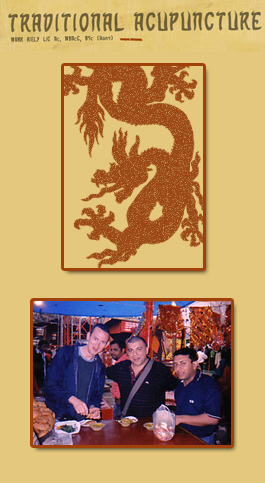Traditional Chinese Medicine acupuncturist who specialises in stress and stress-related conditions, musculo-skeletal, and the treatment of morning sickness.
SERVICES
Welcome to Mark Kiely - Traditional Acupuncture
About Us
Acupuncture involves the insertion of very fine needles into specific areas of the body. The aim of the practitioner is to correct energy imbalances in the patient's body.
These imbalances may entail a deficiency of Qi (the body's own energy), a blockage of the flow
of Qi (the result of an accident or overuse), or an accumulation of bad energy (such as a result of infection, emotional problems or lifestyle).
The Clinic
Situated in a quiet courtyard a short distance from Lordship Lane, Push Studios is an ideal location for Mark's south London clinic.
The studios offer yoga, pilates, ballroom dancing, and personal training among their activities. There is a comfortable waiting area with full facilities and treatments take place in a specially-equipped room.
Acupuncture
Acupuncture is a form of medicine very different to that which has evolved in the western world over the last four hundred years. However, if we look further back in time to classical Mediterranean and European medicine, the theories and practices of Galen, Hippocrates, and their contemporaries bear great similarity to the Eastern traditions. In the West, in recent centuries medical science has built upon the great technological and philosophical advances of the Enlightenment, which has allowed for incredible advances in areas such as surgery, psychoanalysis, and genetics. Sadly, alongside these advances, traditional practices and knowledge have been forgotten. A good example of this is the introduction of penicillin. Whilst undoubtedly a great achievement in the history of humanity, it was seen in the medical world as a panacea for all ills - and traditional herbal remedies were discarded. How many of us know of the antirheumatic and anti-inflammatory properties of meadowseet - or indeed have even heard of this plant that grows widely in our own natural environment. As recently as one hundred years ago, our great grandparents still possessed knowledge such as this.
In China and other parts of East Asia, traditional forms of medicine have remained more popularly available in society. However, it must be said that acupuncture and the locating of points on the body with specific medical attributes is not unique to this part of the world. Although sharp stones and bones dating back to 6,000 BC provide the oldest evidence of its use in China, archaeologists suggest that the earliest application of acupuncture treatments in Asia took place on the other side of the Himalayas in India. In Europe, a Copper Age man from 3,300BC found frozen in ice in the Italian Alps 1991 had a series of tattoos highlighting well-known acupuncture points. Significantly, the uses of these points are for medical conditions that scientific analysis of his body showed that he suffered from. It would seem that our ancestors all over the world had some awareness of acupuncture. Interestingly, even animals show an awareness of how physical manipulation of an area of their body can have a physiological effect. Kangaroos inhabiting the arid heat of the Australian Outback lick a point on the medial surface of their upper limb that has an abundance of blood capillaries near the skin. This cools their body temperature at the hottest times of the day - it also corresponds to a very important acupuncture point on humans called Nei Guan.
About the Practitioner
Mark Kiely LiC Ac, MBAcC, BSc(hons) previously worked in the wine trade. He has travelled extensively, and on his travels became fascinated by many aspects of Asian culture. Five years ago, he was looking for a change of direction and, having previously experienced acupuncture himself as a patient, decided that this was a career path he wished to pursue. He attended the London College of Traditional Acupuncture and Oriental Medicine in Finchley, North London, for four years to obtain a degree in acupuncture. Upon successful completion of the course, he became a full member of the British Acupuncture Council.
The course that he studied is fully comprehensive and covers the following areas:- The principals and application of traditional Chinese medical diagnosis
- The location of acupuncture points on the body and specific properties of each point
- Anatomy
- Western medical physiology and pathology
During his time of study, Mark also completed a short course in medical Qi Gong. He regularly practises the postures he learned and will demonstrate for patients any particular exercise he feels will benefit them.
Among the conditions he has treated are the following; sciatica, ulcerative colitis, morning sickness, thrush, high blood pressure, tiredness, digestive problems, lower back pain, neck tension, susceptibility to respiratory infections, shingles, muscular dystrophy, headaches, insomnia and hayfever.
He specialises in the treatment of stress and stress-related conditions. He passionately believes that acupuncture can be an invaluable means to help patients overcome emotional, mental, or physical stress.
Mark lives in South London, a short distance away from the clinic and can be reached at any time on his mobile phone.
QUALIFICATION DETAILS
Lic Ac, MBAcC, BScC (Hons) in Acupuncture, Certificate in Medical Qi Gong
Service Categories
Acupuncture, Cupping, Traditional Chinese Medicine (TCM)
|
|
 |